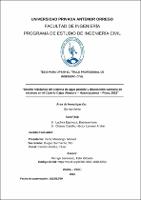Diseño hidráulico del sistema de agua potable y disposición sanitaria de excretas en el Caserío Cajas Alumbre – Huancabamba – Piura, 2022

View/
Download
(application/pdf: 83.44Mb)
(application/pdf: 83.44Mb)
Date
2023Author(s)
Lachira Espinoza, Buenaventura
Chávez Castillo, Héctor Leyneer Andret
Metadata
Show full item recordAbstract
La presente indagación tuvo el objetivo de realizar un diseño hidráulico del sistema
de agua potable y disposición sanitaria de excretas en el Caserío de Cajas Alumbre
– Huancabamba – Piura, 2022, por medio de un esquema metodológico basado en
un enfoque cuantitativo, de nivel propositivo y de tipo aplicada, asimismo, se
empleó una muestra con 430 habitantes, los cuales abarcan a 153 viviendas
beneficiarias. Sus hallazgos demostraron que, el levantamiento topográfico se
desarrolló en un terreno accidentado con alrededor de 4587 puntos, además, con
lo que respecta al estudio de suelos se localizaron de tipo arena limosa, limo
elástico, arcilla inorgánica y limos, por otro lado, en relación al diseño hidráulico,
este se realizó bajo tuberías de aducción y conducción de una longitud de 552
metros y 3 536 metros, respectivamente; en adición, el diseño de la disposición de
excretas fue ejecutado bajo un sistema de 153 UBS de tipo compostera.
Finalmente, se concluyó que, el desarrollo de este proyecto permitirá potencializar
la calidad de vida al reducir los efectos adversos ante la exposición de fuentes de
abastecimiento de agua potable inadecuadas y de una infraestructura sanitaria
precaria. The objective of this investigation was to carry out a hydraulic design of the drinking
water system and sanitary sewage disposal in the Cajas Alumbre - Huancabamba
- Piura, 2022 hamlet, by means of a methodological scheme based on a quantitative
approach, at a propositional level and applied type, also, a sample of 430 inhabitants
was used, which include 153 beneficiary households. Its findings showed that the
topographic survey was carried out in an uneven terrain with about 4587 points, in
addition, with regard to the soil study, silty sand, elastic silt, inorganic clay and silt
were located, on the other hand, in relation to the hydraulic design, this was carried
out under adduction and conduction pipes with a length of 552 meters and 3,536
meters, respectively; in addition, the design of the excreta disposal was executed
under a system of 153 UBS of composting type. Finally, it was concluded that the
development of this project will enhance the quality of life by reducing the adverse
effects of exposure to inadequate drinking water supply sources and a precarious
sanitary infrastructure.
Collections
- Ingeniería Civil [1260]

